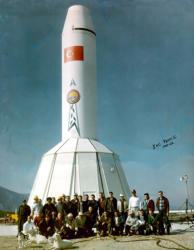HISTORY - Page 44
A second problem area was to be resolved through a logistics planning conference. The object here was to
effect a smooth transfer of logistic responsibility from the Army to the Air Force. Mobile Air Materiel Area
(MOAMA) had been made responsible for the logistic support program. To effect the transition, ABMA
established the JUPITER Support Management Office (JSMO), which was staffed by contractor personnel.
This group was involved in provisioning plans, maintenance analyses, equipment deployment plans, and
determining contractor support requirements. By June 1958, they had already published a considerable
amount of material on technical aspects of the missile and its GSE
58
.
Perhaps one of the more difficult areas to resolve was the interservice agreement between the Army and
the Air Force. The principal problem involved the method by which the Air Force would reimburse ABMA.
An agreement was reached in October 1958, after an eight-month discussion on the matter, that the Army
would provide facilities and instructor personnel to conduct training, accomplish the research and
development program. As originally stated, the document was to terminate on 30 June 1960, but
agreement difficulties with host nations that eventually employed the weapon caused a stretch-out to 1
June 1961; then, 31 December; and, finally, some 2 1/2 man-years of work to close out the program, that is,
the Army part, by 30 June 1962
59
.
_____________________________







58. Ibid.; Hist, ABMA, Jan-Jun 58, pp. 48-50.
59. (16->59) 16. Ibid.; DF, Cont Off, ABMA, to R&D Liaison Off, ABMA, et. al., 28 Feb 58, subj: Proposed Inter-Service Agreement-JUP Msl Prog Mgmt US Army-USAF, Hist Off files; JUP
Chronology; SAC SM-78 (JUP Opnl Plan, as revised, 4 Mar 62; Case History, Hist of the JUP Tng Prog, pp. 20-21, Hist Off files.



Jupiter SM-78 Weapon System
I&C Team 2, Çigli AB, Turkey 1961-1962 Chrysler Corporation Missile Division

HISTORY - Page 44
A second problem area was to be resolved through a
logistics planning conference. The object here was to
effect a smooth transfer of logistic responsibility from
the Army to the Air Force. Mobile Air Materiel Area
(MOAMA) had been made responsible for the logistic
support program. To effect the transition, ABMA
established the JUPITER Support Management Office
(JSMO), which was staffed by contractor personnel.
This group was involved in provisioning plans,
maintenance analyses, equipment deployment plans,
and determining contractor support requirements. By
June 1958, they had already published a considerable
amount of material on technical aspects of the missile
and its GSE
58
.
Perhaps one of the more difficult areas to resolve was
the interservice agreement between the Army and the
Air Force. The principal problem involved the method
by which the Air Force would reimburse ABMA. An
agreement was reached in October 1958, after an
eight-month discussion on the matter, that the Army
would provide facilities and instructor personnel to
conduct training, accomplish the research and
development program. As originally stated, the
document was to terminate on 30 June 1960, but
agreement difficulties with host nations that
eventually employed the weapon caused a stretch-out
to 1 June 1961; then, 31 December; and, finally, some 2
1/2 man-years of work to close out the program, that
is, the Army part, by 30 June 1962
59
.
_____________________________
58. Ibid.; Hist, ABMA, Jan-Jun 58, pp. 48-50.
59. (16->59) 16. Ibid.; DF, Cont Off, ABMA, to R&D Liaison Off, ABMA, et. al., 28 Feb 58, subj:
Proposed Inter-Service Agreement-JUP Msl Prog Mgmt US Army-USAF, Hist Off files; JUP
Chronology; SAC SM-78 (JUP Opnl Plan, as revised, 4 Mar 62; Case History, Hist of the JUP Tng
Prog, pp. 20-21, Hist Off files.





















